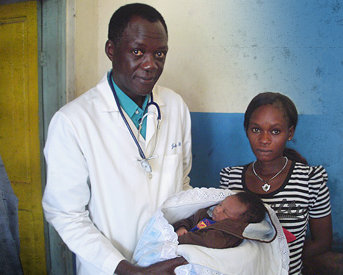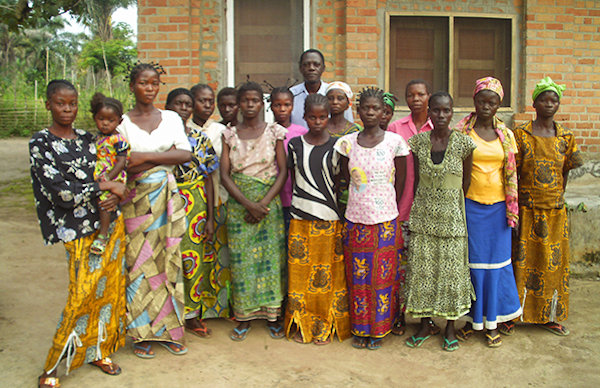Dr. Pierre Manya, a missionary supported by the Detroit Conference, reports on his ministry to improve family health in DR Congo.
Dr. Pierre Manya
Missionary, Bd of Global Ministries
As a missionary doctor who coordinates health and medical services for the Central Congo Episcopal Area, I am happy to share news of our exciting health-care ministries.
I am thankful for the support of so many United Methodists throughout our connection. As my medical work focuses on obstetrics and gynecology, I see many families through pregnancy and childbirth.
Therese Manu, whom I have seen recently, has come to the hospital for her fourth pregnancy. She is 26 years old and has three children. If she continues at this rate (as so many women in the DR Congo do) she will end up with 10 children by the time she is 35. In our country, where the economy of the household is in the hands of women, learning how to defer and space out the births of children is more than a necessity.
According to official national statistics, there are 549 deaths for every 100,000 living births in the DR Congo. A lack of information on family planning is one reason for this statistic.

Seven out of 10 women in the country have never heard of family planning. Family planning is not practiced even by many educated women, and yet it is an important intervention to reduce the deaths caused by illegal and dangerous abortions or during pregnancy and the delivery process. There are lots of misconceptions around this issue of family planning. People think that a woman who uses pills or any other contraceptive means ends up unable to become pregnant—or worse, contracts womb cancer.
The other side of this ignorance of the importance of family planning results in poor health for the mother and the children and poverty for the family. Families with numerous children are those whose children often suffer from malnutrition.
Women are very strong when it comes to feeding the family. They will create small businesses, grow small gardens, sell their crafts, or find other means to bring in income. There is a saying that states that it is better to warn than to cure. We believe that education, information, and training will solve many problems. Education is feasible and cost-effective.
But, as I cannot be everywhere at the same time, we need to educate and train village midwives so that they, in turn, can repeat the message to as many women as possible. Husbands must also be invited to training sessions to understand the rationale of family planning because, in many instances, they are the main obstacle.
Our God is a God who takes care of and provides for the needy, the poor, the sick, the oppressed, and the marginalized. I see evidence of God’s grace, love, and presence in the faces and actions of the people with whom and for whom I serve. God protects them and wants us to do likewise—to love in deeds and not in words only.
The Democratic Republic of Congo is the second largest country in Africa by its size, with over 70 million people. Paradoxically, despite its riches in mineral resources, this country has Africa’s second highest rate for deaths during pregnancy and at delivery. The average rate of deliveries per month is 30 to 35 women in each of concern is helping women who struggle to give birth, whose health and delivery complications sometimes lead to the death of either the mother or the baby, or both.
These preventable deaths greatly disturb me. In African culture, women who do not have children experience great sadness, blame, and stigma. So I do all I can to help women deliver safely. Maternity is very important in our culture. It is always a great joy when a baby is born. We stress the importance of prenatal consultation. Many of our women struggle because of poverty. They seek to thrive and survive in living conditions that cause them to neglect their health.
Though a woman may do prenatal consultations from the first day she discovers her pregnancy to her day of giving birth, unexpected complications or bleeding can still happen. If there is no urgent intervention, death can occur. In addition, fetal suffering generally happens at the time of delivery. We are trying to find ways to help women who might need a Cesarean section (C-section) to have it free of charge in order to save the baby and the mother.
“The Bible teaches us that where human wisdom stops there God starts to work. God never leaves God’s children alone.”
In the Congo, medical consumable materials (suture thread, packets of blood, compresses, anesthesia, oxygen, adhesive plaster), oil (for the generator), and medicines are needed. All this amounts to approximately $60 per C-section. This does not count the number of hours put in by the medical personnel needed to perform the surgical procedure. We seek to provide affordable health care; therefore, we cannot charge realistic fees. We are dependent upon God to move in the hearts of individuals, congregations, and government agencies to provide materials, equipment, and funds to subsidize our ongoing budgetary needs.
Last fall, a woman who had been raped was brought in for treatment. She had become pregnant as a result. She was just a little over three feet tall. The man responsible for the act had disappeared. At the end of the pregnancy, a C-section was required, as she couldn’t give birth normally. Without that intervention, death was highly likely, because neither she nor her family could afford the cost of a C-section.

The Bible teaches us that where human wisdom stops there God starts to work. God never leaves God’s children alone.
This particular intervention was possible because of the wider United Methodist support of my ministry. I paid $200 for the operation, $100 for her food, and $100 for other related expenses.
She couldn’t believe it. She is now a witness to God’s love—and proclaims that love to anyone who will listen. That had it not been for the church, she could have died. Both she and the baby are doing well.
In the DR Congo, 56 percent of women’s deaths are due to pregnancy complications. But the struggle is on several fronts. While we are working hard to inform men and women about the importance of family planning and prenatal consultation, rape is causing more damage and pain. In general, women are ashamed to denounce rape for fear of rejection by their family and community. Educating people about changing their behavior is important.
In addition to medical intervention, we are also working on the following preventive measures in the Central DR Congo Conference: training midwives and nurses at the maternity clinic to be aware of their roles; continuing the mobilization and involvement of community members to encourage women to avoid giving birth at home; promoting family planning to keep mothers and children in good health.
~Dr. Pierre Diamba Manya was born in Ndju in eastern Kasai Province of the DR Congo. Following secondary school, he received his Preparatory Certificate in Sciences at Bukavu in 1975. In 1983 he graduated from the University of Kinshasa as a doctor of medicine and as a surgeon, with a specialty in gynecology and obstetrics. He has been in medical mission since 1984 and currently supervises all of the United Methodist-related medical facilities in the Central Congo area and monitors their compliance with official standards. This article was originally published in the March-April 2016 issue of New World Outlook magazine. Used by permission.
Last Updated on December 15, 2023

